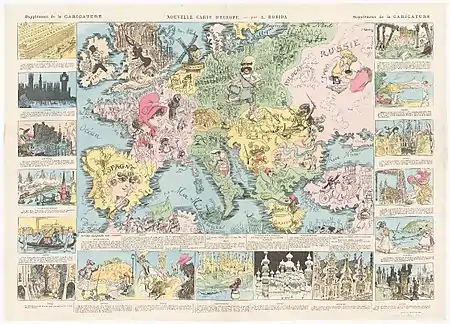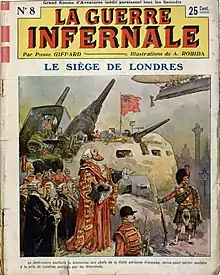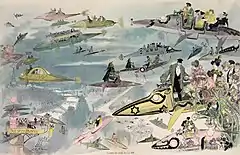Albert Robida
Albert Robida (14 May 1848 – 11 October 1926) was a French illustrator, etcher, lithographer, caricaturist, and novelist. He edited and published La Caricature magazine for 12 years. Through the 1880s, he wrote an acclaimed trilogy of futuristic novels. In the 1900s he created 520 illustrations for Pierre Giffard's weekly serial La Guerre Infernale.
Albert Robida | |
|---|---|
 Robida c.1894 | |
| Born | 14 May 1848 Compiègne, France |
| Died | 11 October 1926 (aged 78) Neuilly-Sur-Seine, France |
| Occupation | Writer, illustrator, etcher, lithographer, caricaturist, novelist, publisher |
| Nationality | French |
| Genre | Children's Books, Graphic novels |
Biography
He was born in Compiègne, France, the son of a carpenter. He studied to become a notary, but was more interested in caricature. In 1866 he joined Journal amusant as an illustrator. In 1880, with Georges Decaux, he founded his own magazine La Caricature, which he edited for 12 years. He illustrated tourist guides, works of popular history, and literary classics. His fame disappeared after World War I.

Futuristic Trilogy
Albert Robida was rediscovered thanks to his trilogy of futuristic works:
- Le Vingtième Siècle (1883)
- La Guerre au vingtième siècle (1887)
- Le Vingtième siècle. La vie électrique (1890)
These works drew comparison with Jules Verne. Unlike Verne, he proposed inventions integrated into everyday life, not creations of mad scientists, and he imagined the social developments that arose from them, often with accuracy: social advancement of women, mass tourism, pollution, etc. His La Guerre au vingtième siècle describes modern warfare, with robotic missiles and poison gas. His Téléphonoscope was a flat screen television display that delivered the latest news 24-hours a day, the latest plays, courses, and teleconferences.
Works with Pierre Giffard


Robida illustrated two works by Pierre Giffard:
- La Fin du Cheval ("The End of the Horse"), on the inevitable replacement of the horse by the bicycle and then by the car.
- La Guerre Infernale ("The Infernal War"), a 1908 serial adventure novel for children that appeared weekly every Saturday. Robida contributed 520 illustrations. The novel is set in the future and features uncanny parallels to World War Two, including an attack on London by Germany and a conflict between Japan and the United States. It was subsequently republished as a book.[1]
Bibliography
- Futuristic

- Voyages très extraordinaires de Saturnin Farandoul, 1879 (translated by Brian Stableford as The Adventures of Saturnin Farandoul)
- Le Vingtième Siècle, 1883 (translated by Phillipe Willems as The Twentieth Century)
- La Guerre au vingtième siècle, 1887
- Le Vingtième Siècle. La vie électrique, 1890 (translated by Brian Stableford as Electric Life)
- Voyage de fiançailles au XXe siècle
- Un chalet dans les airs (translated by Brian Stableford as Chalet in the Sky)
- L'horloge des siècles, 1902 (translated by Brian Stableford as The Clock of the Centuries ISBN 978-1-934543-13-9)
- L'Ingénieur von Satanas, 1919
- Other work
- L'Île de Lutèce : enlaidissements et embellissements de la Cité
- La Bête au bois dormant
- La Part du hasard
- Le Voyage de M. Dumollet
- Les Vieilles Villes d'Italie : notes et souvenirs
- La Grande Mascarade parisienne
- La Fin des Livres, with Octave Uzanne
- Contes pour les bibliophiles, with Octave Uzanne
- Les Vieilles Villes d'Espagne, notes et souvenirs
- Un caricaturiste prophète. La guerre telle qu'elle est
- 1430, les assiégés de Compiègne
- Paris de siècle en siècle ; le cœur de Paris, splendeurs et souvenir
- Le 19e siècle
- Les Escholiers du temps jadis
- Les Vieilles Villes d'Italie : notes et souvenirs
- Le Voyage de M. Dumollet
- La Vieille France series
- La Bretagne, text, drawings and 40 additional lithographies hors by A. Robida, Paris, Librairie illustrée, ca. 1900, 336 p.
- La Touraine, text, drawings and lithography by A. Robida, Paris, La Librairie Illustrée, 336 p., 40 illustrations, undated [1892]. Tome II: Le Mans, Laval, Sablé, Angers, Saumur, Thouars, Loudun, Chinon, Vendôme
- Normandie, text, drawings and lithographies by A. Robida, Paris, La Librairie illustrée, undated [1890], 331 pages, 40 additional duotone illustrations. Tome II: Bayeux, Lisieux, Bernay, Honfleur, Le Havre, Fécamp, Dieppe, Eu, Rouen, Louviers, Évreux, Vernon. Republished: Éd. de Crémille, Genève, 1994, 169 p.
- Provence, Paris, À la Librairie illustrée, undated [1893], 332 p. Avignon, Barbentane, Orange, Carpentras, Vaucluse, Cavaillon, Sisteron, Tarascon, Beaucaire, Arles, Marseille, Toulon, Fréjus, Nice, Monaco, Menton, Aix, Nîmes, Uzès, Montpellier, Béziers, Narbonne, Carcassonne
- Paris, Splendeurs et Souvenirs, Éditions de Crémille, Genève, 1992, textes, dessins et lithographies par A. Robida, 824 p., 2 volumes. Tome 1 : Le Cœur de Paris, 412 p. Tome 2 : Paris, de Siècle en Siècle, 412 p.
Notes
- Iannuzzi, Giulia (2017), The Cruel Imagination: Oriental Tortures from a Future Past in Albert Robida’s Illustrations for La Guerre infernale (1908), EUT Edizioni Università di Trieste, ISBN 9788883038426, retrieved 6 April 2019
Critical studies
- Elizabeth Emery, "Albert Robida, Medieval Publicist," in: Cahier Calin: Makers of the Middle Ages. Essays in Honor of William Calin, ed. Richard Utz and Elizabeth Emery (Kalamazoo, MI: Studies in Medievalism, 2011), pp. 51–55.
External links
| Wikimedia Commons has media related to Albert Robida. |
| French Wikisource has original text related to this article: |
- Albert Robida... et son blog (in French)
- 'French Medieval Tales in the 19th Century', British Library blog
- The friends of Albert Robida site (in French)
- 1942 Life magazine article on accuracy of Robida's predictions of future warfare, with pictures
- Works by "Albert" Robida at Project Gutenberg
- Works by or about Albert Robida at Internet Archive
- Works by Albert Robida at LibriVox (public domain audiobooks)
